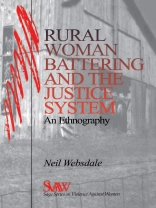Addressing a significant void in the extant literature on the topic of domestic violence, Rural Woman Battering and the Justice System presents a thorough and arresting look at the experiences of battered women in rural communities. While living in the rural areas of Kentucky, Neil Websdale conducted his ethnographic research, and he situated the voices of rural battered women at the center of his ethnography. He clearly demonstrates how rural patriarchy and the insidious ‘good ol′ boy network’ of law enforcement and local politics sustain and reproduce the subordinate, vulnerable, isolated position of many rural women. Taking into account that traditional patterns of intervention can often put women in isolated communities at further risk, the author recommends a coordinated multiagency approach to rural battering that is spearheaded by state feminist agencies. The chapter on the difficulties of an educated male researcher working with rural battered women offers a definite methodological plus. Illuminating and accessible, Rural Woman Battering and the Justice System makes a most important and timely contribution to the field.
An excellent training resource for anyone working with battered women, especially in rural areas, Rural Woman Battering and the Justice System is highly recommended for law enforcement and criminal justice professionals, practitioners, advocates, shelter personnel, and advanced students in related courses of study, as well as academics and researchers.
Tabla de materias
For Batter or for Worse
Rural Patriarchy, Crime and Criminal Justice
Woman Battering and Criminal Justice
Policing Rural Woman Battering
The Compromised Enforcement of Law
Courting Revictimization
The Courts and Rural Woman Battering
Regulating Rural Women
The Patriarchal State
Rural Battering and Social Policies
Sobre el autor
For Neil Websdale, a Northern Arizona University professor in criminology and criminal justice, the power of education extends far beyond the classroom. For nearly 20 years, Websdale has worked to educate students, law enforcement officials, and policy makers about better ways to prevent domestic violence. One of the key ways in which he does this is by helping to establish domestic violence review teams, which use a systematic approach for analyzing domestic violence in order to prevent future occurrences. In his work, Websdale focuses on collaboration and education: attempting to mitigate the negative effects of domestic violence requires an informed group effort.












